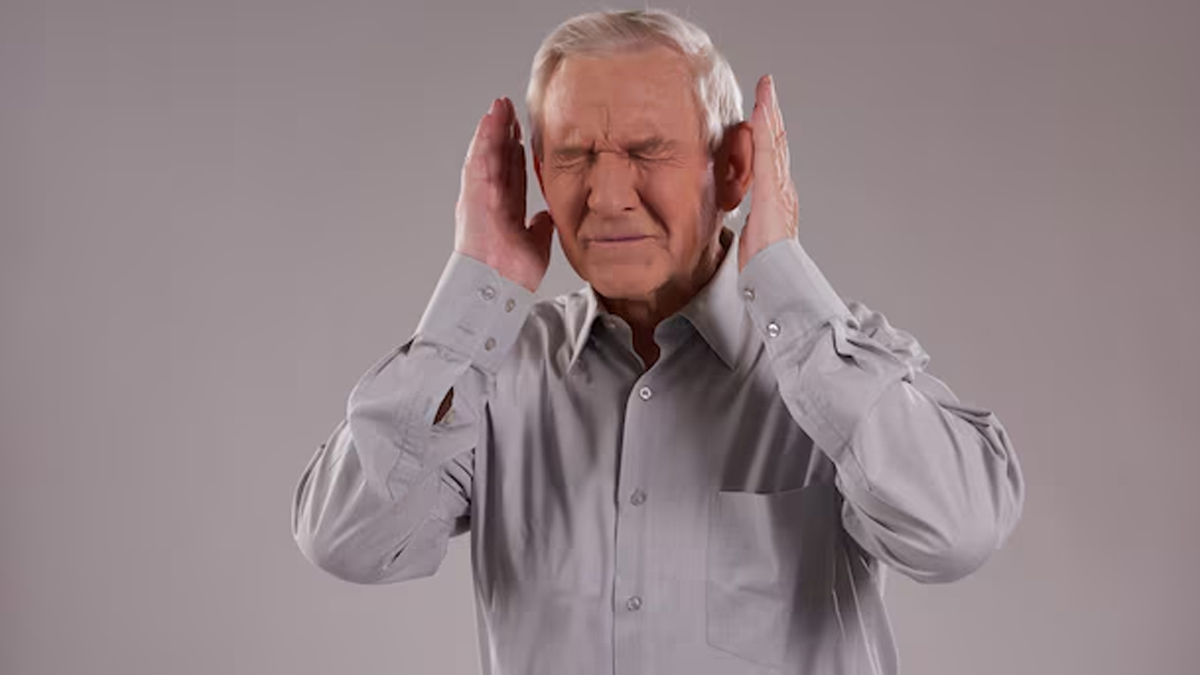
Have you ever felt as though your ears are ringing? It could be a buzzing, roaring, clicking, hissing, humming, or even high-pitched sound. If so, then you may be suffering from tinnitus, a medical term to describe the perception of sound when no external sound is present.
Table of Content:-
While tinnitus can arise from various causes, with the most common being noise-induced hearing loss and age-related hearing loss, the condition can also be associated with high blood pressure or circulation problems. The OnlyMyHealth team interacted with Dr Girish Anand M S, Consultant - ENT Surgery, Aster CMI Hospital, Bengaluru, to find out about the connection.
Also Read: What’s That Whooshing In Your Ears? Here’s When It’s Worth Paying Attention
Understanding The Link Between Tinnitus And High Blood Pressure

According to Dr Anand, high blood pressure can sometimes cause ringing in the ears, or tinnitus, because elevated pressure affects blood flow through the delicate vessels near the ears. "When blood pressure is high, it can increase the force of blood moving through these vessels, creating a pulsing or ringing sound, often called pulsatile tinnitus," he explains.
The doctor adds that this is more noticeable in quiet environments or when lying down.
Over time, uncontrolled hypertension can damage blood vessels, reducing their elasticity and affecting circulation to the inner ear, which may worsen tinnitus.
A study published in Frontiers in Neurology, comparing 144 people with tinnitus to 140 without it, found that high blood pressure was more common in those with the condition. The link was especially strong in older adults. Researchers also noticed that certain blood pressure medications, including ACE inhibitors, thiazide diuretics, potassium-sparing diuretics, and calcium channel blockers, were used more often by people with tinnitus. This raises the possibility that these drugs might contribute to the ringing in the ears, though more research is needed to confirm whether they play a direct role.
How To Know If Circulation Issues Are Causing Ringing In The Ears

Because the inner ear relies on a steady flow of oxygen-rich blood to function properly, other circulation problems can also lead to ear ringing, or tinnitus, Dr Anand suggested, adding that conditions like atherosclerosis, where arteries narrow due to plaque build-up, can create turbulent blood flow near the ear and cause pulsatile tinnitus.
Blood clots, vascular malformations, or aneurysms in blood vessels around the head and neck can also affect hearing.
Even anaemia, which reduces oxygen delivery, may trigger ringing in the ears.
Moreover, poor circulation from diabetes or peripheral artery disease can worsen symptoms.
Warning Signs That Indicate Tinnitus Is Heart-Related
Dr Anand shares, "Tinnitus may be heart-related if the ringing in your ears has a rhythmic, pulsing quality that matches your heartbeat, known as pulsatile tinnitus."
"This type of sound often becomes more noticeable when lying down, bending over, or after physical exertion, as changes in blood flow make it louder," he adds.
Also Read: Harmless Ear Bud Can Trigger Tinnitus, How to Safely Clean Your Ears?
Other warning signs include:
- Effect on both ears
- Dizziness
- Shortness of breath
- Chest pain
- Irregular heartbeat
- Sudden changes in hearing
Dr Anand also warns, "If the sound is in sync with your pulse, and especially if it appears suddenly or worsens quickly, it may signal an underlying cardiovascular problem such as high blood pressure, atherosclerosis, or a vascular abnormality, and should be evaluated by a doctor promptly."
When To See A Doctor

If the ringing in the ears is persistent and lasts more than a week, worsens over time, or affects your daily life, sleep, or concentration, it is best to consult a doctor. "Immediate medical attention is needed if tinnitus is sudden in onset, occurs in only one ear, or is accompanied by dizziness, hearing loss, headache, facial weakness, or symptoms of heart problems like chest pain or palpitations," he emphasises.
Pulsatile tinnitus ringing that matches your heartbeat should always be checked promptly, as it can indicate vascular issues.
"Even if the sound is mild, chronic tinnitus can be linked to treatable conditions such as high blood pressure, ear infections, or medication side effects, so early evaluation can help prevent complications and improve quality of life," Dr Anand concluded.
Also watch this video
How we keep this article up to date:
We work with experts and keep a close eye on the latest in health and wellness. Whenever there is a new research or helpful information, we update our articles with accurate and useful advice.
Current Version